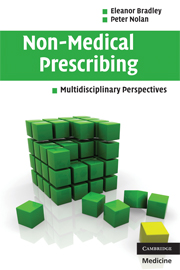Book contents
- Frontmatter
- Contents
- List of contributors
- Foreword
- Preface
- Acknowledgements
- Introduction
- 1 Medicines and prescribing – past and present
- 2 Nurse prescribing – impact, education and sustainability
- 3 Nurse prescribers: from 2003 to 2006
- 4 Nurse prescribing experienced
- 5 Nurse prescribing observed
- 6 Pharmacists and prescribing
- 7 Professions allied to medicine and prescribing
- 8 Conclusions
- Index
- References
5 - Nurse prescribing observed
Published online by Cambridge University Press: 22 August 2009
- Frontmatter
- Contents
- List of contributors
- Foreword
- Preface
- Acknowledgements
- Introduction
- 1 Medicines and prescribing – past and present
- 2 Nurse prescribing – impact, education and sustainability
- 3 Nurse prescribers: from 2003 to 2006
- 4 Nurse prescribing experienced
- 5 Nurse prescribing observed
- 6 Pharmacists and prescribing
- 7 Professions allied to medicine and prescribing
- 8 Conclusions
- Index
- References
Summary
Unlike other prescribers who work solely in private practice, the majority of nurses do not work in isolation; instead, they work in a variety of teams and organisations. To implement non-medical prescribing successfully, it goes without saying that the prescribers need to be competent, confident and adaptable. In addition, there are other important factors that will influence the success of this new venture. These include the composition of the team in which nurses are working, the quality of communication within the team and the extent to which each member understands the role of other members. New ways of working require professionals to be open to change and rethink professional boundaries because change involves many more than those charged with initiating it. There must be clear benefits to having a nurse prescriber within the team, and all team members much be prepared to support him or her. If teams do not understand the role or, worse, feel that the role has been imposed on them, it is highly likely that disillusionment and dysfunctionality will arise. Equally, the attitudes of service users towards nurses' prescribing role and their understanding of it are critical because the way in which they engage with nurse prescribers will determine whether the anticipated benefits of nurse prescribing are realised or not.
This chapter is based on the findings of three studies which focused on service users' experiences of nurse prescribing, the attitudes and experiences of healthcare team members towards nurse prescribing and, finally, the views of doctors.
- Type
- Chapter
- Information
- Non-Medical PrescribingMultidisciplinary Perspectives, pp. 89 - 112Publisher: Cambridge University PressPrint publication year: 2008



